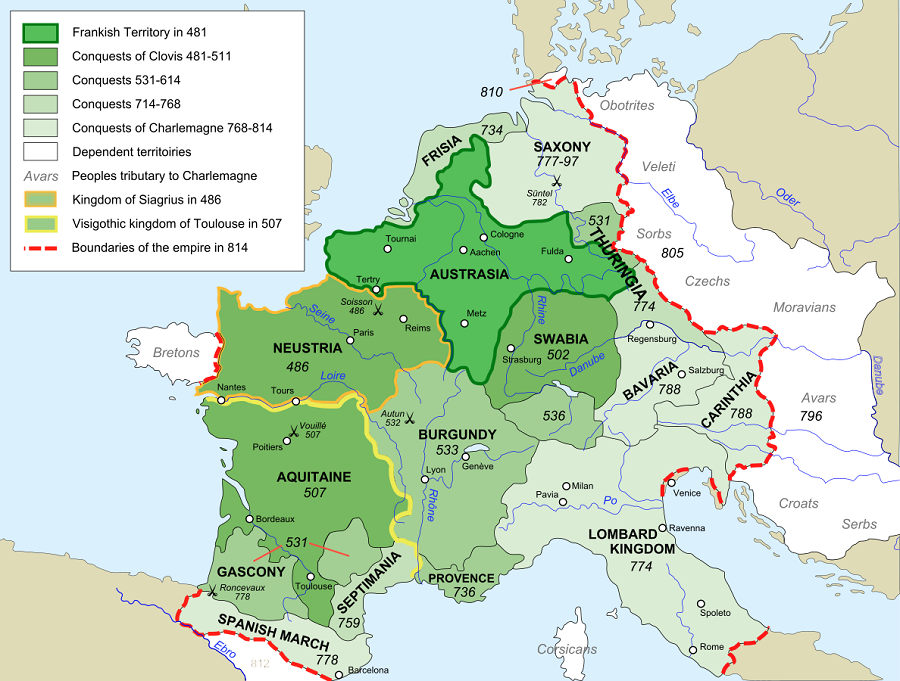The center of the dominion was no longer in ancient Gaul; he had transferred it to a point not far from the Rhine, in the midst and within reach of the Germanic populations.
Continuing Charlemagne,
our selection from A Popular History of France from the EarliestTimes, Volume 1 by François P.G. Guizot published in 1869. For works benefiting from the latest research see the “More information” section at the bottom of these pages. The selection is presented in fourteen easy 5 minute installments.
Previously in Charlemagne.
Time: 799

CC BY-SA 3.0 image from Wikipedia
Although continually obliged to watch, and often still to fight, Charlemagne might well believe that he had nearly gained his end. He had everywhere greatly extended the frontiers of the Frankish dominions and subjugated the populations comprised in his conquests. He had proved that his new frontiers would be vigorously defended against new invasions or dangerous neighbors. He had pursued the Huns and the Slavons to the confines of the Empire of the East, and the Saracens to the islands of Corsica and Sardinia. The center of the dominion was no longer in ancient Gaul; he had transferred it to a point not far from the Rhine, in the midst and within reach of the Germanic populations, at the town of Aix-la-Chapelle, which he had founded, and which was his favorite residence; but the principal parts of the Gallo-Frankish kingdom, Austrasia, Neustria, and Burgundy, were effectually welded in one single mass. What he had done with Southern Gaul has just been pointed out; how he had both separated it from his own kingdom, and still retained it under his control. Two expeditions into Armorica, without taking entirely from the Britons their independence, had taught them real deference, and the great warrior Roland, installed as count upon their frontier, warned them of the peril any rising would encounter. The moral influence of Charlemagne was on a par with his material power; he had everywhere protected the missionaries of Christianity; he had twice entered Rome, also in the character of protector, and he could count on the faithful support of the Pope at least as much as the Pope could count on him. He had received embassies and presents from the sovereigns of the East, Christian and Mussulman, from the emperors of Constantinople and the caliphs of Bagdad. Everywhere, in Europe, in Africa, and in Asia, he was feared and respected by kings and people. Such, at the close of the eighth century, were, so far as he was concerned, the results of his wars, of the superior capacity he had displayed, and of the successes he had won and kept.
In 799 he received, at Aix-la-Chapelle, news of serious disturbances which had broken out at Rome; that Pope Leo III had been attacked by conspirators, who, after pulling out, it was said, his eyes and his tongue, had shut him up in the monastery of St. Erasmus, whence he had with great difficulty escaped, and that he had taken refuge with Winigisius, Duke of Spoleto, announcing his intention of repairing thence to the Frankish King. Leo was already known to Charlemagne; at his accession to the pontificate, in 795, he had sent to him, as to the patrician and defender of Rome, the keys of the prison of St. Peter, and the banner of the city.
| <—Previous | Master List | Next—> |
More information here and here, and below.
 |
We want to take this site to the next level but we need money to do that. Please contribute directly by signing up at https://www.patreon.com/history
Leave a Reply
You must be logged in to post a comment.